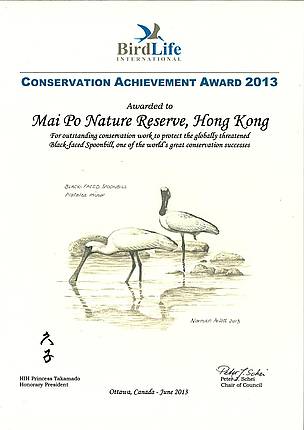BirdLife International Award Recognizes WWF’s Conservation Achievements
WWF-Hong Kong and the Mai Po Management Committee are honored to be the first-ever Hong Kong conservation organization to receive the BirdLife International Conservation Achievement Award. Presented in June, 2013, the award recognizes WWF and other conservation organizations’ efforts and achievements in protecting the endangered Black-faced spoonbill. The latest census has revealed a global population of over 2,700 birds, almost a ten-fold increase from a low of 288 individuals recorded in 1988-1990.
Underlining the robust cooperation that has taken place between Hong Kong and Taiwan, the two most important wintering sites for the Black-faced spoonbill, the award was also presented to the following parties from Taiwan: the Forestry Bureau of the Council of Agriculture, the Construction and Planning Agency of the Ministry of the Interior, the City of Tainan and Taijiang National Park
In 1988-1990, the first international census of the Black-faced spoonbill found a global population of just 288 individuals, and the species was considered at risk of extinction. Mai Po held the second-largest wintering population, with 50 birds present; while Taiwan hosted the largest wintering population.
Conservation action since then has involved research into the species’ wintering habitat requirements, migration routes and breeding sites. Satellite tracking of birds from Hong Kong has proved to be important for the identification of their breeding grounds in Korea, which were found to be mostly in the demilitarized zone. Work on restoring and enhancing wetland habitats for the Black-faced spoonbill has also taken place at Mai Po and other sites.
After about 20 years of conservation work, the 2013 census revealed a global population of 2,725 birds, almost ten times the 1990 figure. Mai Po still supports the second-largest wintering population: around 350-400 birds winter in Hong Kong each year; more than the total global population in 1990. A population increase has also been seen at other wetland sites along the coast of China, including nature reserves at Haifeng, Zhangjiangkou and the Minjiang Estuary, where WWF Hong Kong has worked with the reserve authorities and local communities to improve waterbird protection and wetland management.
Although the future for Black-faced spoonbill is now considered to be more secure, they are still listed as an Endangered species on the IUCN’s Red List. WWF aims to continue its conservation work and provide Black-faced spoonbills with a high-quality habitat long in the future.
Underlining the robust cooperation that has taken place between Hong Kong and Taiwan, the two most important wintering sites for the Black-faced spoonbill, the award was also presented to the following parties from Taiwan: the Forestry Bureau of the Council of Agriculture, the Construction and Planning Agency of the Ministry of the Interior, the City of Tainan and Taijiang National Park
In 1988-1990, the first international census of the Black-faced spoonbill found a global population of just 288 individuals, and the species was considered at risk of extinction. Mai Po held the second-largest wintering population, with 50 birds present; while Taiwan hosted the largest wintering population.
Conservation action since then has involved research into the species’ wintering habitat requirements, migration routes and breeding sites. Satellite tracking of birds from Hong Kong has proved to be important for the identification of their breeding grounds in Korea, which were found to be mostly in the demilitarized zone. Work on restoring and enhancing wetland habitats for the Black-faced spoonbill has also taken place at Mai Po and other sites.
After about 20 years of conservation work, the 2013 census revealed a global population of 2,725 birds, almost ten times the 1990 figure. Mai Po still supports the second-largest wintering population: around 350-400 birds winter in Hong Kong each year; more than the total global population in 1990. A population increase has also been seen at other wetland sites along the coast of China, including nature reserves at Haifeng, Zhangjiangkou and the Minjiang Estuary, where WWF Hong Kong has worked with the reserve authorities and local communities to improve waterbird protection and wetland management.
Although the future for Black-faced spoonbill is now considered to be more secure, they are still listed as an Endangered species on the IUCN’s Red List. WWF aims to continue its conservation work and provide Black-faced spoonbills with a high-quality habitat long in the future.
For more information:










0 Comment :
Post a Comment
Thanks for your comment!